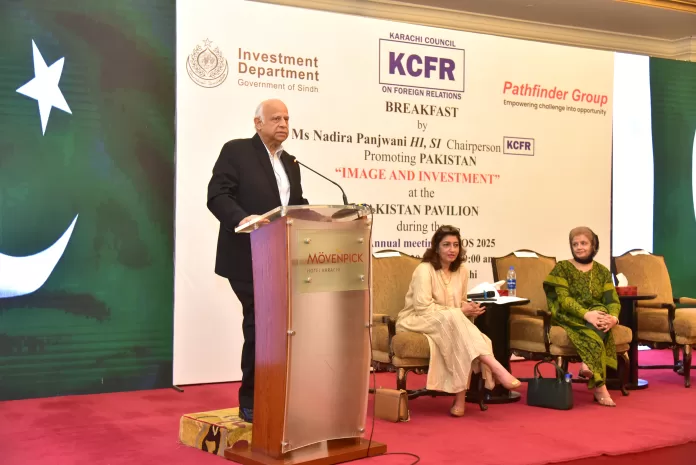
Dr Huma Baqai, Moderator Sr. Vice Chairperson, KCFR
Assalam U Alaikum. Good Morning! It is an immense pleasure for me to be asked by Ikram Sehgal, Co-Chairman of the Pathfinder Group to give an overview of this event as I have been a small part of it since 2018. Ikram Sehgal called me and said, “Huma, do this, you’ve been to DAVOS thrice,” I replied, “No, Mr. Ikram Sehgal, I’ve been to DAVOS four times.” And yes, that’s the story, which gives me a certain edge to stand in front of you and speak about it. I’ve been to DAVOS in 2018, 2019, 2022, and 2023, and whenever I didn’t go, I regretted it later after seeing what had happened there.
To give you a small understanding of what DAVOS is and how Sehgal has been a lone fighter. He has carried this flag high in DAVOS as a private initiative, through his efforts, commitment, and love for this country. I quote what he said when this was launched, “Pakistan should be projected somehow, and the pavilion is an experiment in that direction.
Nationals from various countries and heads of sub-companies are coming to see what Pakistan offers to the world”. These are his words, gentlemen, and he has carried this torch so far. We hope and pray for its continuity
The debut of the Pakistan Pavilion happened in January 2018, set up with the financial assistance of the Pathfinder Group and the Martin Dow Group, in association with the Swiss Asian Chamber of Commerce. Roping in the Swiss Asian Chamber of Commerce for those of you who understand the dynamics, is not an easy task.
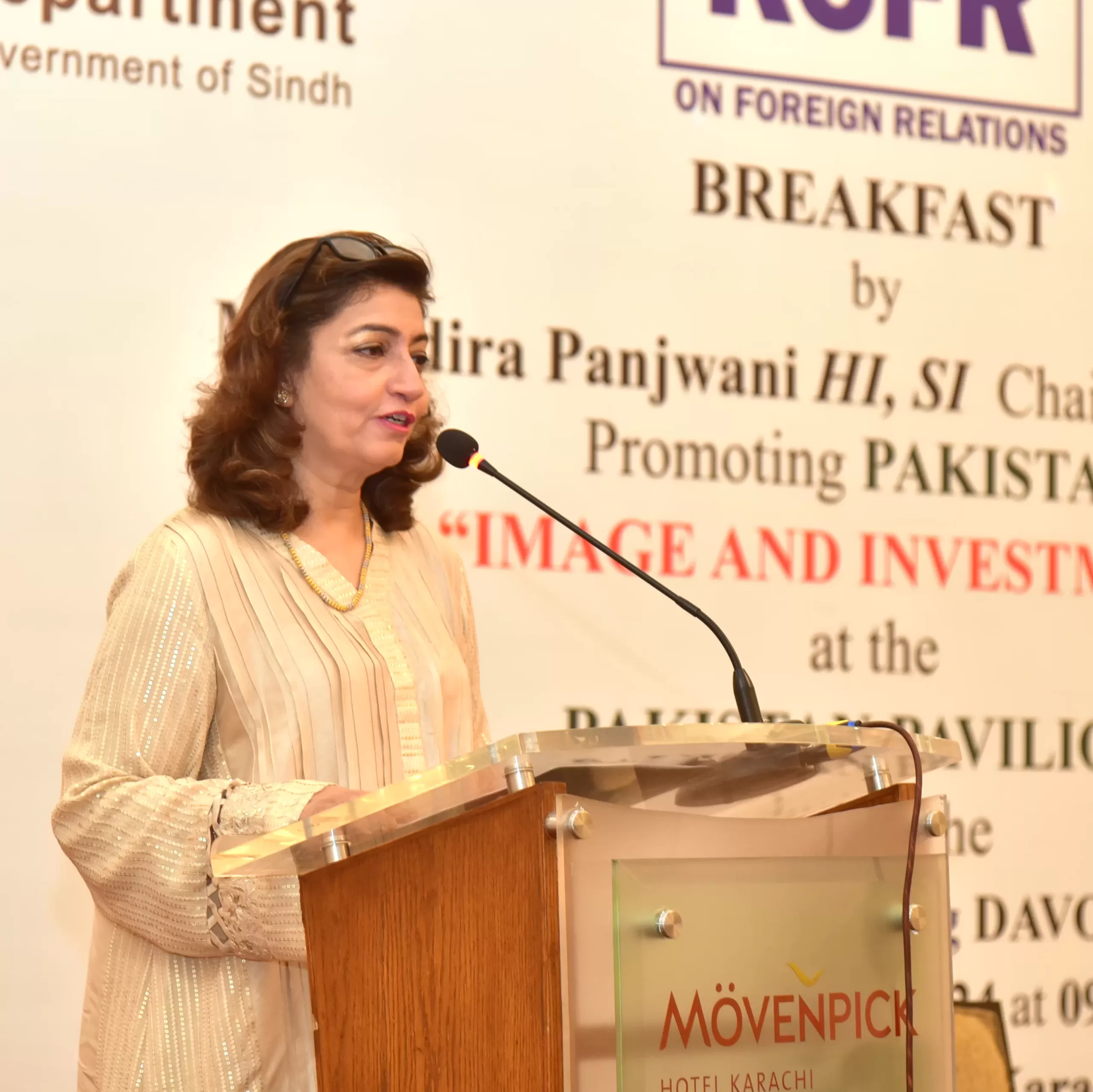
However, there’s something else I want to address here, and perhaps Sehgal won’t be happy about it, but I’ll take the liberty of my association with him to go ahead and say a few things. He would not talk to, at least not to many people in public, about how Martin Dow supported this initiative. I was also at one of the events when Martin Dow supported it, and it went beautifully. But when leadership passed on to the next generation after Mr. Jawed Akhai passed away, the support was withdrawn. Most people thought that this initiative would collapse, but it was Ikram Sehgal who dug deep into his pockets to keep it moving forward. Trust me it is not easy. For those of you who have been there and those who will choose to join us on our next journey to DAVOS, will realize that pulling off an event of this kind is not simple – be it security, the financial impact, or gathering so many people together and bringing them to one point. Whether it is the Breakfast or the Pavilion, it is one Herculean effort and he’s been doing it year after year, without any personal gain.
He employs 15,000 people across the country, so this is not something he has to do; it’s something he does for Pakistan. Given the scale of the enterprise, we, along with Ikram Sehgal, have tried to engage others to join this initiative. I know of at least one entity, whose name I won’t mention, that initially committed, agreed to everything, and then backed out. Yet, Sehgal continued to carry on alone for the sake of Pakistan. I believe the man deserves some recognition here.
Over the years, notable figures have attended the Pakistan Breakfast which is always full-house. I’ve been a part of it four times, and it’s consistently packed. It starts at 7:30 in the morning, and I travel for an hour and a half to get there, leaving my hotel around 5 a.m., as do many others who attend with pleasure because it’s such an honour to be a part of the event. The list of attendees is extensive and it would take the entire morning to name them all but I can tell you that every Prime Minister has attended. Bilawal Bhutto, Sherry Rehman, Sania Nishtar, Dr. Ishrat Iqbal, caretaker Prime Minister Anwaar-ul-Haq Kakar, and the Chief Minister of Balochistan have all graced the Pavilion, discussing issues and attracting significant media attention.
A particularly noteworthy moment was when Bilawal Bhutto held a press conference at DAVOS during a critical time, which was seen as a relaunch for him. While he spoke impressively, it was the Pakistan Pavilion that provided him the platform to do so. I’ve also witnessed Mr. Ikram Sehgal and his team struggling with the government of Pakistan, which has often been unresponsive, non-cooperative, and even arrogant. Despite merely attending the event being beneficial, the government acts as if it is doing us a favour and still demands prime seats and special treatment. The pity is, as a former prime minister, Shahid Khaqan Abbasi, once said at the event in response to a simple question about why the government doesn’t support this initiative, ‘Aren’t you glad the government hasn’t taken it up? It’s doing wonderfully well in the private sector.’ I have come to admire Abbasi more since he left PMLN, as he’s been making a lot of sense lately, though he always had sensible things to say. Running this initiative is not easy; it’s a private effort that plays a crucial role in promoting Pakistan’s point of view and projecting its soft image on a global stage. I’m speaking from the heart now, beyond my prepared text.
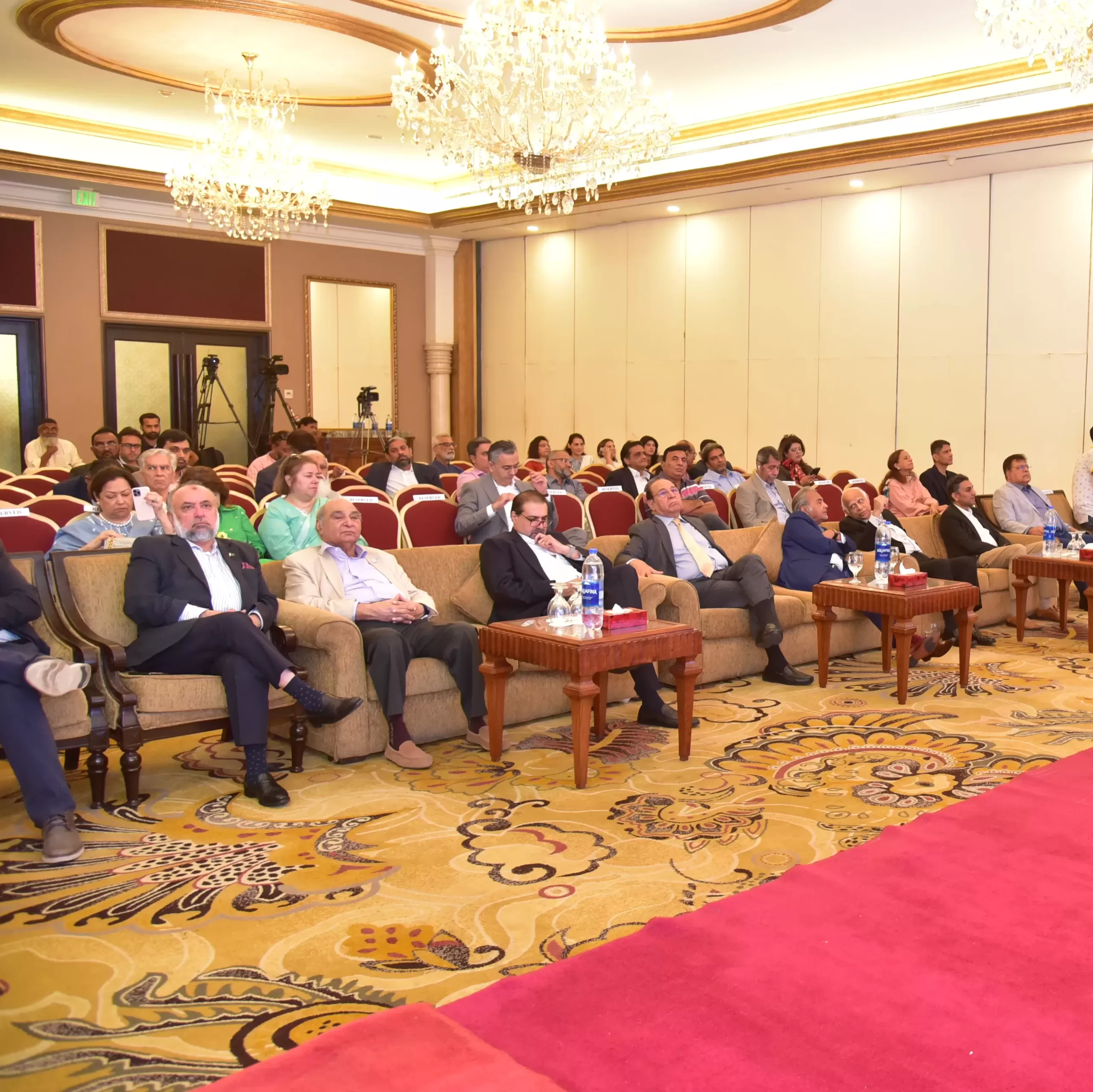
There’s this street, which is the main happening street of DAVOS, where it is costly. We also have our pavilion there, and subsequently, the Breakfast. India represents at least 40% of the entire street; India controls it, and India serves there. We are very India-centric in many things, but this is where we need to be more India-centric. The Indian private sector is supported—I’ve been to their lounges, and I’ve spoken to people. They are supported tooth and nail by the Indian government to project India. You see their textiles, their spices, their computer outputs—you name it. We have one Pavilion; they have at least 15 to 20. The most high-profile businessmen are there. Don’t you think it’s time for Pakistan to realize where the new fronts are that we need to present? We have left these posts unnamed, whether it’s intellectual forums, the projection of Pakistan for economic turnaround, growth, or progress—whatever you’d like to call it. These are the new fronts where wars are being fought, and with that comes the whole construct of image building.
If there is one exercise that is done every year for Pakistan at DAVOS, where the decision-makers and the movers and shakers of the world gather, it’s to decide what the world’s agenda will be for the next year. They are lovingly or not so lovingly called the ‘Fat Cats of the world,’ but they sit there and set the terms. The terms that you will hear in 2025 about geopolitics, economics, climate, progress, growth, and world peace will be coined right here at DAVOS. One term that was constantly heard, and which I frequently used in my conversations, was ‘Polycrisis.’ This term came into existence two years ago, rooted in the World Economic Forum, among various other systems. At DAVOS, you come face to face with people you’ve only met or heard on the internet. They hold events and talks and you’re free to attend them. I’ve always felt I could do much more but couldn’t, and even within the Pakistan Pavilion, there are discussions, talks, and conversations that put forward the image of Pakistan. I have come across people who say, ‘Are you from Pakistan?’ and I proudly reply, ‘Yes, I am very much from Pakistan.’ I was at a women’s empowerment discussion there and I realized how the Pakistan Pavilion and DAVOS itself set the path.
The discussion on Eurasia happened last year; the whole concept was launched by Mr. Ikram Sehgal, who understood its importance. What was the SCO summit that just happened? It is a Eurasian organization bringing out the narrative of the South to counter the overwhelming toxic narrative of the West that talks about the Ukraine-Russia war but does not address what is happening in the Middle East. Ladies and gentlemen, this is what DAVOS is all about and this is what the Pakistan Pavilion and the Breakfast are all about. It allows people to counter the very negative image that Pakistan usually carries and they see it firsthand.
So, I think, we should all thank Ikram Sehgal for this. More importantly, we should come together to help the man. How long can he do it on his own? Thank you so much. Now, for moderating the event, I’m going to invite Miss Nadira Panjwani to give a formal introduction to the organization and many other things.
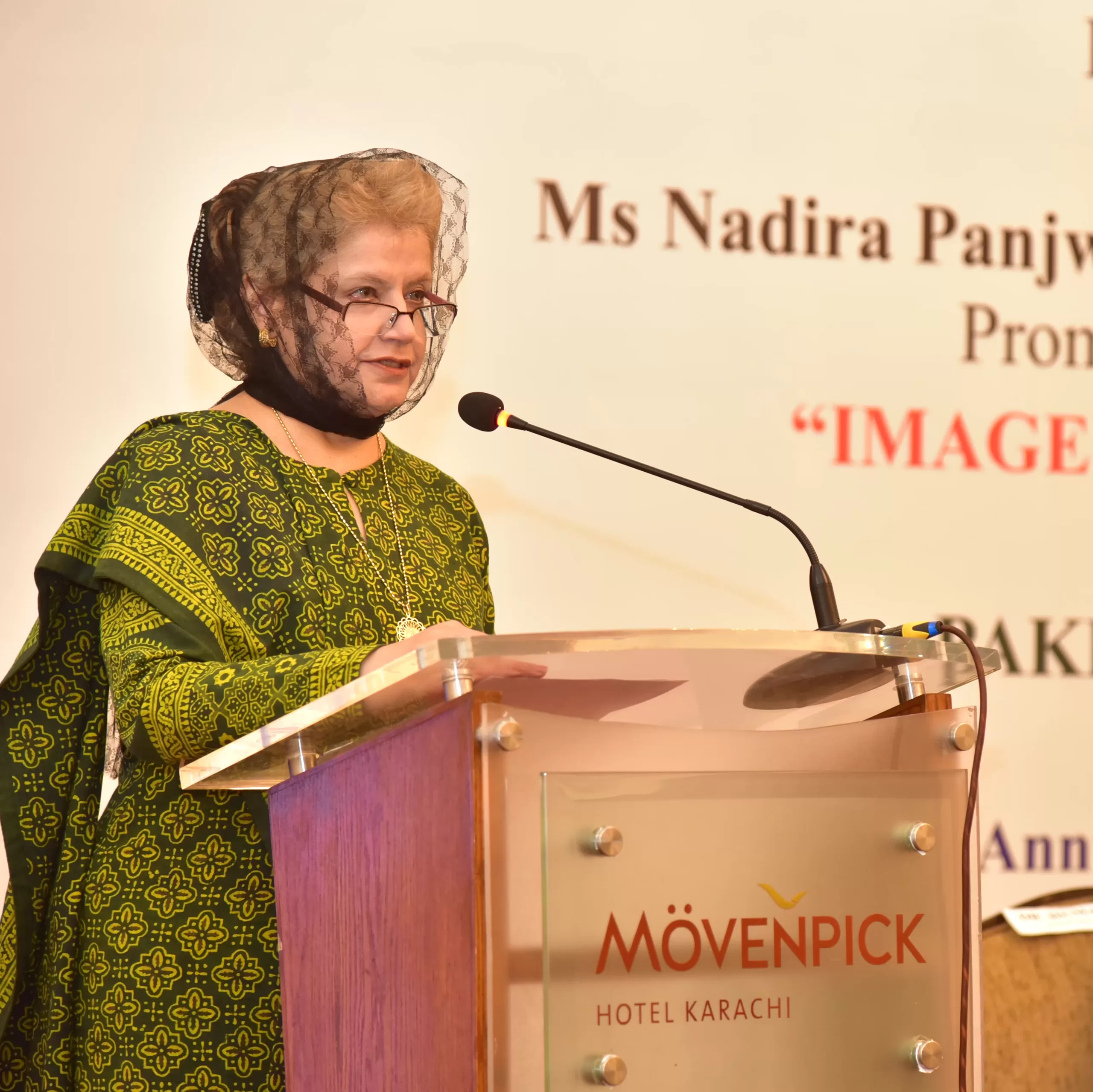
Nadira Panjwani (HI, SI) Chairperson, KCFR
Distinguished guests, ladies, and gentlemen, Assalam o Alaikum, and welcome. We are delighted to welcome all of our esteemed guests to this event, which is a collaboration between the Karachi Council on Foreign Relations (KCFR) and the Pathfinder Group. Dr Huma Baqai has already provided an overview of what DAVOS is about and the role of Pathfinder Group in the Pakistan Pavilion there, so I’ll just be adding a bit more. As you know, the World Economic Forum was established in 1971 by the renowned German professor Klaus Schwab at the University of Geneva. Initially, it was named the European Management Forum, and after 16 years in 1987 it was renamed the World Economic Forum. Klaus Schwab held the first assembly of his organization in DAVOS, Switzerland, in the winter of 1971, gathering around 450 Western European executives. The objective was to introduce them to American business models and practices. Over time, the forum gained traction and has evolved into an influential think tank and platform for addressing a wide range of diverse topics. Its declared mission is to improve the state of the world by engaging leaders in business, politics, academia, and various fields of society to shape global, regional, and business agendas.
The World Economic Forum is essentially a foundation funded by its leading member business corporations. Global enterprises with an annual turnover of more than $5 billion are the key members, and they set the agenda for discussion and decisions. They advocate that globalization, free trade, technological innovation, and sustainability should be the guiding principles for business and the progress of society. ‘The Great Reset’ and ‘The Global Redesign’ are two significant concepts that originated here, reflecting the forum’s vision of a world that requires largescale systemic changes in response to all forms of crisis, whether financial, geopolitical, environmental, or health-related. Connected to these two concepts is the idea of stakeholder capitalism, which prioritizes the interests of all stakeholders instead of just shareholders. It emphasizes that, along with the interests of owners and investors, those of employees, communities, and the environment must be considered equally.
Every year during the summit, the Global Competitiveness Report is published, ranking countries based on various economic indicators such as infrastructure, state of human resources, and capacity for innovation. This report influences the investment decisions of countries and multinational corporations. Similarly, the Global Risks Report, published by this forum highlights emerging threats to global stability, such as cybersecurity issues, pandemics, and environmental degradation. This helps visionary and proactive governments exercise foresight and plan for international cooperation. The concept of the Fourth Industrial Revolution was also popularized at the World Economic Forum, describing the ongoing fusion of digital, physical, and biological technologies. The key technologies driving the Fourth Industrial Revolution include Artificial Intelligence, the Internet of Things, robotics, blockchain, biotechnology, quantum computing, and 5G networks. All of these are causing significant disruptions to existing industries and business models. The speed and scale of change require global collaboration and equitable distribution.
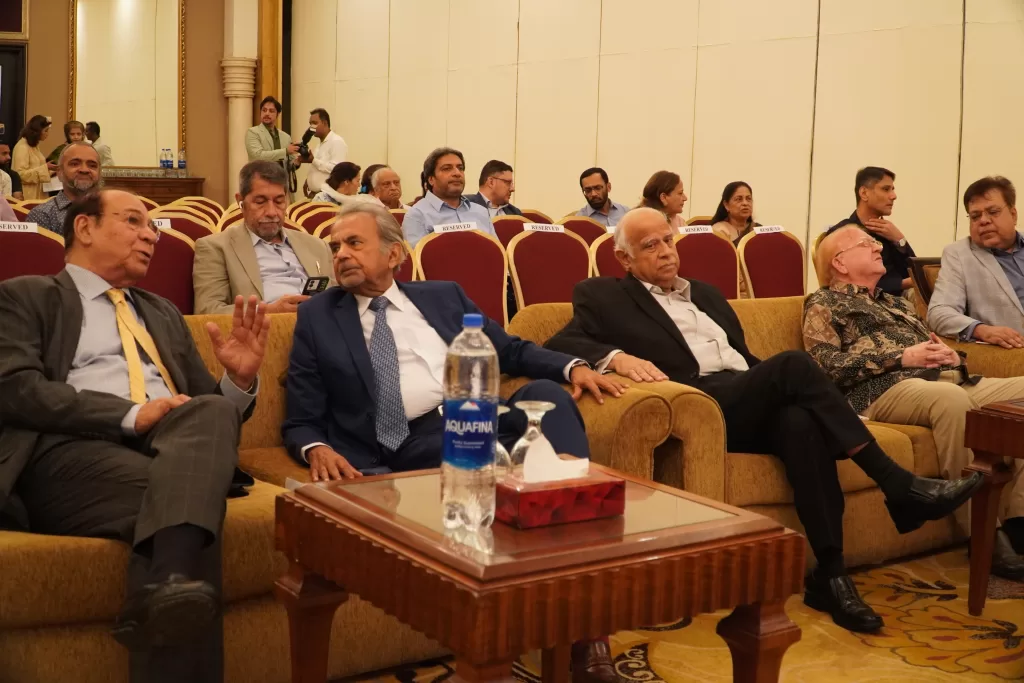
Despite its significant international influence, the World Economic Forum is not without its detractors and critics. Many see the elitist and exclusive nature of the forum as sharply contrasting with the realities faced by the global population. The forum has been accused of promoting the interests of the global elite rather than addressing the needs of marginalized communities. Participants discuss problems like inequality, poverty, and climate change in the luxurious and expensive location of the Alpine town of DAVOS, which is generally inaccessible to those most affected by these issues.
Another valid criticism is the limited and selective impact of the forum’s deliberations and recommendations on governments and corporations. For example, in recent years, participants have talked extensively about climate change and its devastating effects on our planet, yet some corporations continue operations that cause significant environmental degradation. Still, with all its flaws, the World Economic Forum remains an important and influential networking platform. Heads of state, CEOs of multinational corporations, thought leaders, and activists converge on DAVOS annually to discuss pressing global challenges. Almost all countries from every continent attend the summit to promote investment, shape global economic policy, engage in diplomacy, and foster public-private partnerships. The forum is indeed dominated by the leading economies but developing countries also make significant efforts to gain visibility on this platform. As mentioned earlier, our neighbour India sends high-level delegations to DAVOS, led by its Prime Ministers and corporate leaders. They invest millions of dollars each year in elaborate marketing and public relations campaigns, and this strategic foresight has helped position India as a hub for technology, manufacturing, and innovation. Pakistani Heads of State and leaders have been attending the DAVOS Summit, but unfortunately, the presence of the Pakistani private sector at the summit has remained limited.
The Karachi Council on Foreign Relations takes great pride in the fact that its Patron-in-Chief and former Chairman, Ikram Sehgal, initiated the concept of a Pakistan Pavilion at DAVOS more than 20 years ago. He has kept the Pakistani flag flying high there, and to my mind, this is visionary and strategic philanthropy, which in the long run, can be far more empowering and effective than simply providing free meals and handouts. It showcases Pakistan and its many potentials to the world, helps neutralize the negativity that is regularly propagated about us and builds our soft image. Sehgal, KCFR pays tribute to your patriotism and strategic foresight in recognizing this need.
For the past 20 years, many prominent Pakistani personalities have attended the Pathfinder’s Pakistan Pavilion at DAVOS, including General Pervez Musharraf, Mian Muhammad Nawaz Sharif, Imran Khan, Shahid Khaqan Abbasi, Bilawal Bhutto Zardari, and many others. This Pakistani space at DAVOS has presented the best of Pakistan to this international assembly and has been a catalyst for fostering business linkages, dialogue, and collaboration on key economic, social, and geopolitical issues facing our region. I’m sure Sehgal will share more about his endeavours at DAVOS and his plans for the upcoming 2025 Summit. I wish to thank all of you for attending our event and spending your Sunday morning with us. Ladies and gentlemen, thank you very much.
Dr Huma Baqai, Moderator
I would also like to point out that it was the Pathfinder Group that brought the Karachi Council on Foreign Relations (KCFR) to DAVOS, making it, I believe, the only think tank in Pakistan with that distinction. KCFR has been consistently represented there, and it has been an absolute honour and pleasure for Sadeed Malik and me to represent KCFR at DAVOS. Our think tanks in Pakistan are often very inward-looking and with all due respect, many are funded by the establishment, which tends to promote a single perspective. The diversity of views that is needed is being provided by KCFR and this has been facilitated and supported by the Pathfinder Group, for which we remain grateful.
What happens at DAVOS during the Pakistan Breakfast and at the Pakistan Pavilion is truly unique. The Pavilion and the Breakfast represent a collective effort for Pakistan, transcending political parties and individual personalities. It’s solely about Pakistan. I encourage all of you to become advocates for this initiative. Share the message that DAVOS is not just a gathering of the elite making decisions about the world; it’s a platform for us to secure a seat at the table, present Pakistan’s perspective, and attract investment.
Speaking of investment, I am excited to announce our collaboration with the Sindh Government. The Sindh Investment Board is supporting us, and they are represented here today. It is my pleasure to invite Khizar Pervaiz, CEO of the Sindh Enterprise Development Fund (SEDF), to share a few words. Pervaiz holds an engineering degree in Computer Science from Cranfield University in the UK and an MBA from the University of Nottingham. He is truly a promising young leader, and it is individuals like him who represent the new face of Pakistan.
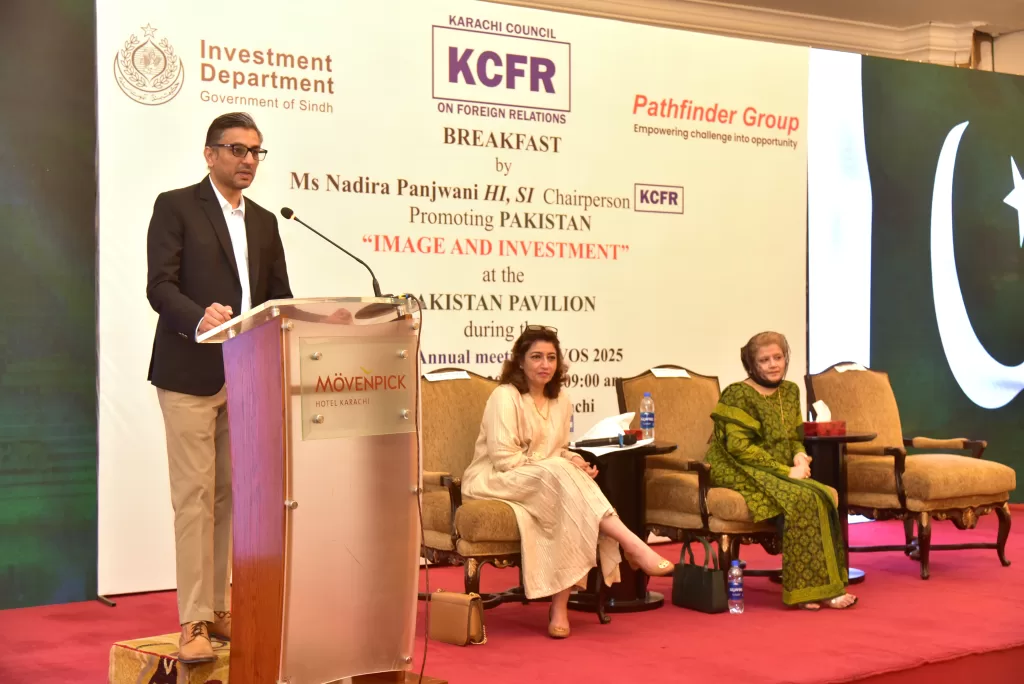
Khizar Pervaiz CEO, Sindh Enterprise Development Fund (SEDF)
Good morning, distinguished guests, Ikram Sehgal, Ms Huma Baqai, and Ms Nadira Panjwani, Assalam o Alaikum. I must say, the inspiring video we just watched has truly motivated me to be at DAVOS this year. I have been planning for this opportunity for the last two years. It is a pleasure to address you all today and we are grateful for the opportunity extended to the Investment Department to participate in this significant event. As the primary entity representing the Sindh Government in matters of investment, we are committed to fostering a conducive environment for both local and foreign investors.
This event, organized by the Pathfinder Group in collaboration with the Karachi Council on Foreign Relations (KCFR), serves as an exceptional platform for promoting investment opportunities in the Sindh region. Our partnership with KCFR has consistently highlighted and advocated for Sindh as a viable investment destination on both national and international stages.
The promotional videos presented here have not only inspired us but have also reinforced our enthusiasm to engage actively in this gathering, showcasing the tremendous potential that Sindh holds for investors. Furthermore, the Pathfinder Group has successfully collaborated with various international partners to elevate Pakistan’s profile in the global investment landscape. This initiative not only enhances the visibility of our region but also encourages foreign investment, which is crucial for our economic development. We look forward to contributing to the discussions and exploring new avenues for collaboration that will benefit not just Sindh and its stakeholders but all of Pakistan.
The Sindh Investment Department encompasses several sub-departments aimed at fostering growth and supporting businesses. I am pleased to share that we actively support small and midsize enterprises (SMEs), establish economic zones, and have authorities dedicated to managing these zones. I would like to acknowledge Ms Huma Baqai for her kind words and I want to highlight that we have several younger candidates who have recently joined the Sindh Government. Among them is our Chief Executive Officer of the Special Economic Zone Authority (SEZA), Faisal Mujeeb, along with other departments focused on Education City and Special Economic Zone management.
The Sindh Government is committed to infusing a younger mindset into our bureaucracy, enabling us to effectively pitch Sindh as an investment-friendly platform. As we heard in the videos, we have a highly skilled workforce and a wealth of resources but it’s all about showcasing these strengths. This credit goes to Sehgal, who has been tirelessly promoting Pakistan for many years. Thank you, sir, for your ongoing efforts. I urge you to continue representing Pakistan not just at DAVOS but across various platforms in Europe, Asia, and beyond. The Investment Department is eager to collaborate with you, Sehgal, to showcase Sindh which will ultimately contribute to the betterment of Pakistan. Thank you all for your attention and I look forward to being part of this initiative in the coming years Insha Allah. Thank you very much.
Dr Huma Baqai, Moderator
Now, I would like to invite Farhat Ali to the stage. He is the Chairman of the Board and the Executive Managing Director of Polygal AG Pakistan, a fully owned subsidiary of Polygal AG Switzerland. In addition to his role at Polygal, Ali is a lead columnist at the Daily Business Recorder, a former President of the Overseas Investors Chambers of Commerce and Industry, and the founding President and a Board Member of the Swiss Business Council of Pakistan.
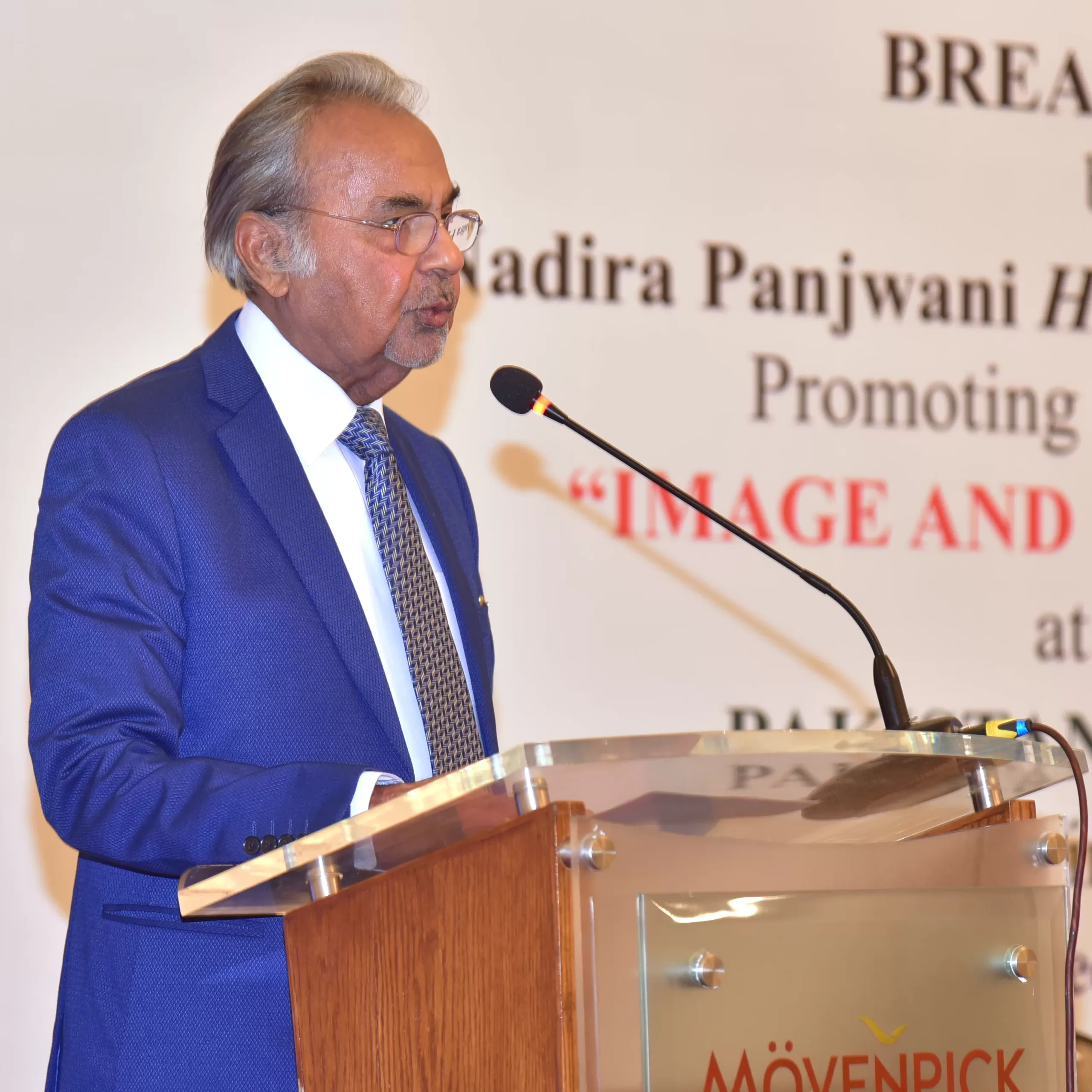
Farhat Ali Founding President & Member of the Board of the Swiss Business Council of Pakistan
Thank you for the introduction. Chairperson Nadira Panjwani, ladies and gentlemen, I would like to share a few words regarding the World Economic Forum at DAVOS before I delve into the specific subject assigned to me. While much has already been said, I feel compelled to add a few thoughts. I have had the privilege of participating in the World Economic Forum events at DAVOS multiple times through the platforms of the Swiss Business Council and the Swiss Asian Chamber of Commerce. Attending sessions on global issues, complemented by casual yet meaningful meetings with prominent global leaders, has always been a profound experience one that would be otherwise difficult to achieve at such a level and in such a short time.
The signature Breakfast organized by the Pathfinder Group at DAVOS is viewed by many of us as a unique opportunity for Pakistan’s branding and identity on this global stage; perhaps it is the only such platform dedicated to our nation. This brave group has been carrying the Pakistan flag at DAVOS for over two decades, with its resources only. However, I must express my disappointment that the excellent platform provided by the Pathfinder Group for global outreach is not being fully leveraged by the Government of Pakistan or by the private sector. There is a need for more engagement and collaboration to maximize this opportunity, ensuring that Pakistan’s voice is heard and its potential is recognized on the international stage. The government stands to benefit significantly by improving the country’s perception, while business groups can utilize this platform to expand globally much like many emerging markets have achieved through participation at the World Economic Forum in DAVOS.
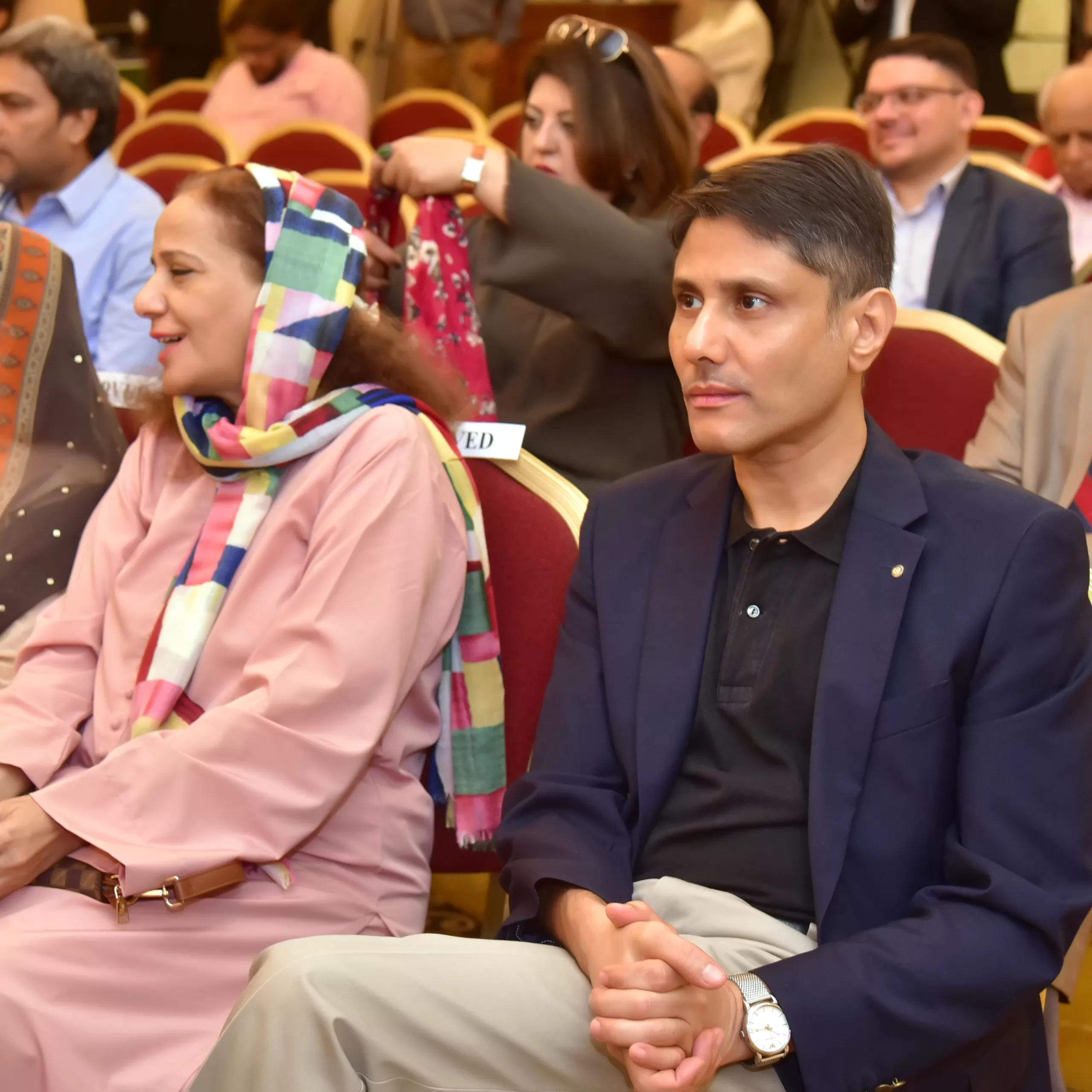
DAVOS offers a unique forum that provides a rare opportunity to enhance Pakistan’s visibility and influence in global discussions. It allows the country to showcase its economic potential and strategic importance while networking with potential investors, thought leaders, and policymakers, which can lead to beneficial collaborations.
Moving on to the subject of business opportunities between Switzerland and Pakistan, I would like to highlight the business model that the two countries are pursuing to develop trade and investment. This model may be of particular interest to Tariq Ikram, given his extensive experience in this field. Under this business model, the entire trade and investment chain between Switzerland and Pakistan is managed by the private sector. This includes business development, facilitation, and implementation, which helps to navigate bureaucratic hurdles efficiently in both countries. The result is a streamlined process that yields tangible results on the ground in a very short time.
This initiative is governed by an agreement between the Swiss Business Council and Swiss Global Enterprise, defining the responsibilities of both partners. Swiss Global Enterprise, headquartered in Zurich, is similar to our Trade Development Authority of Pakistan, but it operates within the private sector, which makes a significant difference.
Swiss Global Enterprise supports around 5,500 businesses primarily small and medium enterprises across Switzerland and in approximately 130 other countries. Under the agreement, the role of Swiss Global Enterprise is to assess the needs of its member companies that are interested in global outreach. It links these companies with the Swiss Business Council under a well-defined mandate established between the two organizations. The Swiss Business Council’s role in Pakistan is to mobilize and manage the presence of assigned Swiss companies through joint ventures, investment, trade, and technology transfer with partnering companies in Pakistan. Over the last three years, Swiss Global Enterprise and the Swiss Business Council have successfully facilitated the integration of multiple Swiss companies into the Pakistani market under this arrangement. Moreover, the Swiss Business Council is continually working to promote the positive aspects of Pakistan in Switzerland. This ongoing effort is aimed at creating a favourable environment for investment and collaboration.
Dr Huma Baqai, Moderator
It is my distinct pleasure to invite our very own Tariq Ikram to the stage. He is not only a prominent member of our board but also a vital asset in our financial endeavours. Ikram has a long-standing association with trade and development associations, showcasing his dedication to advancing economic opportunities. His integrity and commitment to excellence make him a respected figure in our community.
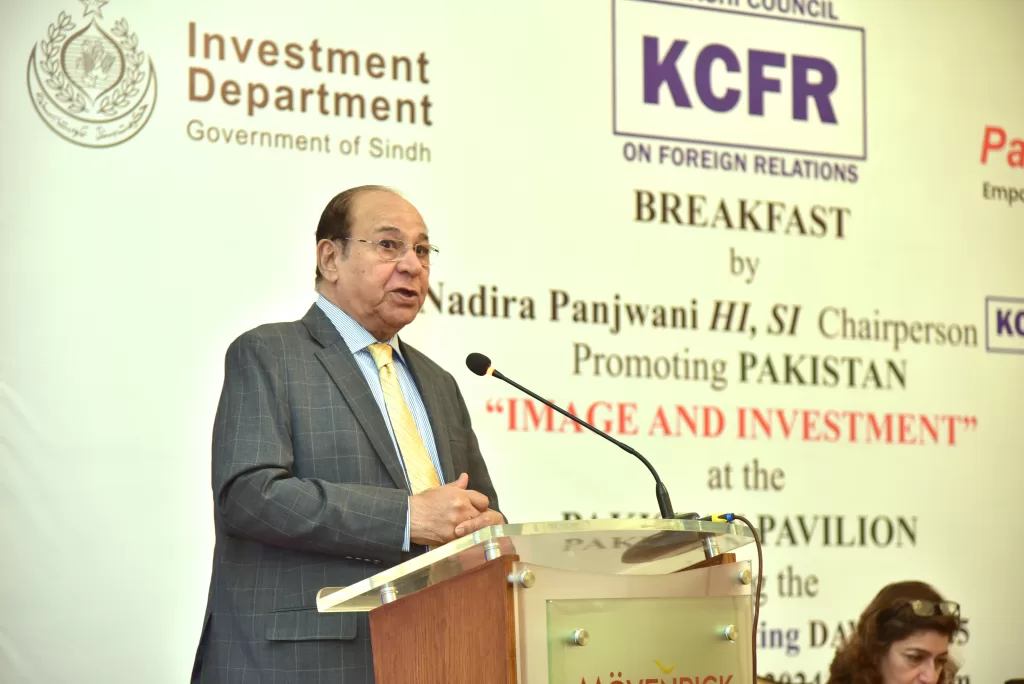
Tariq Ikram Member Board of Governors, KCFR
Ladies and gentlemen, I find myself compelled to take the stage today driven by a profound motivation. Honestly, I must commend Ikram Sehgal for his remarkable work. The reason I’m here today is to share some thoughts on how we can align our initiatives more closely with the pressing national needs of Pakistan. We all know that a staggering 80% of our budget goes toward debt servicing. Therefore, our paramount objective must be to minimize this debt.
I recently went through the IMF’s second review, which outlines essential remedies for our socio-economic development. However, it also forecasts our debt for the current year at a staggering $122 billion to $157 billion, indicating a continuous upward trend. As a nation, we may have to endure this debt burden but we also need to recognize the limitations it imposes on our economic progress. Importantly, the export figures used by the IMF to assess our debt position reflect a mere $38 billion. From my experience leading the export drive in Pakistan for eight years, I can confidently say our export potential ranges between $80 billion to $100 billion. Currently, we are hovering around $25 to $30 billion.
This presents us with a tremendous opportunity. If we can effectively showcase the specific sectors where investments can be directed to boost our exports, it would significantly benefit our economy. While attracting foreign investment is crucial, we must remember that simply bringing in $5 billion, $7 billion, or even $10 billion annually will not resolve our debt issue which currently stands at $122 billion.
Our focus on investment must be coupled with a robust export strategy, especially in the short to medium term. In the long term, we may find solutions but immediate action is vital. As noted by economist Atif Mian, the funds we are investing in Pakistan need to be strategically placed in areas capable of generating revenue in dollars that are crucial for meeting our import needs tied to economic growth. What does Pakistan offer, you may ask? We boast a 1,200-kilometer coastline, renowned for its exquisite prawns and Yellowfin tuna. Our country experiences four distinct seasons, possesses fertile land, and features the largest man-made irrigation system in the world. Additionally, we have a youthful population and an abundance of natural resources, including minerals, oil, gas, copper, and gold. Not to mention, we are home to a rich history that spans 5,000 years, particularly in Sindh.
In conclusion, we must seize the opportunity to showcase Pakistan not just as a land of potential, but as a vibrant, diverse, and profitable destination for investment, an investment that ultimately fuels our export growth and helps alleviate our national debt.
Dr Huma Baqai, Moderator
Ladies and gentlemen, as we reflect on our efforts to project Pakistan on the global stage, it’s essential to recognize how other countries, like Indonesia, effectively showcase their cultural richness and investment opportunities. The resources they allocate for promoting their country are truly astonishing. Their government-sponsored lounges at international events are free to enter, featuring vibrant cultural programs and diverse cuisine. Indonesia, an Islamic country, skillfully presents its nightlife and cultural offerings in a way that captivates and invites engagement. This is a model we can learn from opening up, engaging, and showcasing Pakistan’s unique offerings.
However, we must acknowledge our collective responsibility in this matter. Many of us have been part of this journey, collaborating with Ikram Sehgal, and forming a triangular relationship between KCFR, the Pathfinder Group, and the Sindh Investment Board. Unfortunately, we encountered significant resistance from within. At times, it felt as though our intentions were questioned, as if we were pursuing personal gains rather than national interests. This resistance often came from those within our ranks, people who called out names and doubted the potential of every good initiative.
If we are seeking to assign blame, we must look in the mirror. Our hesitance and scepticism toward positive initiatives hinder our progress. Now, it’s my pleasure to invite Commodore Sadeed Anwar Malik to the stage. He has been our invaluable point of contact at KCFR for many years and possesses a wealth of experience and insight, having attended DAVOS on several occasions. I’m sure he has some inspiring thoughts to share with us today.
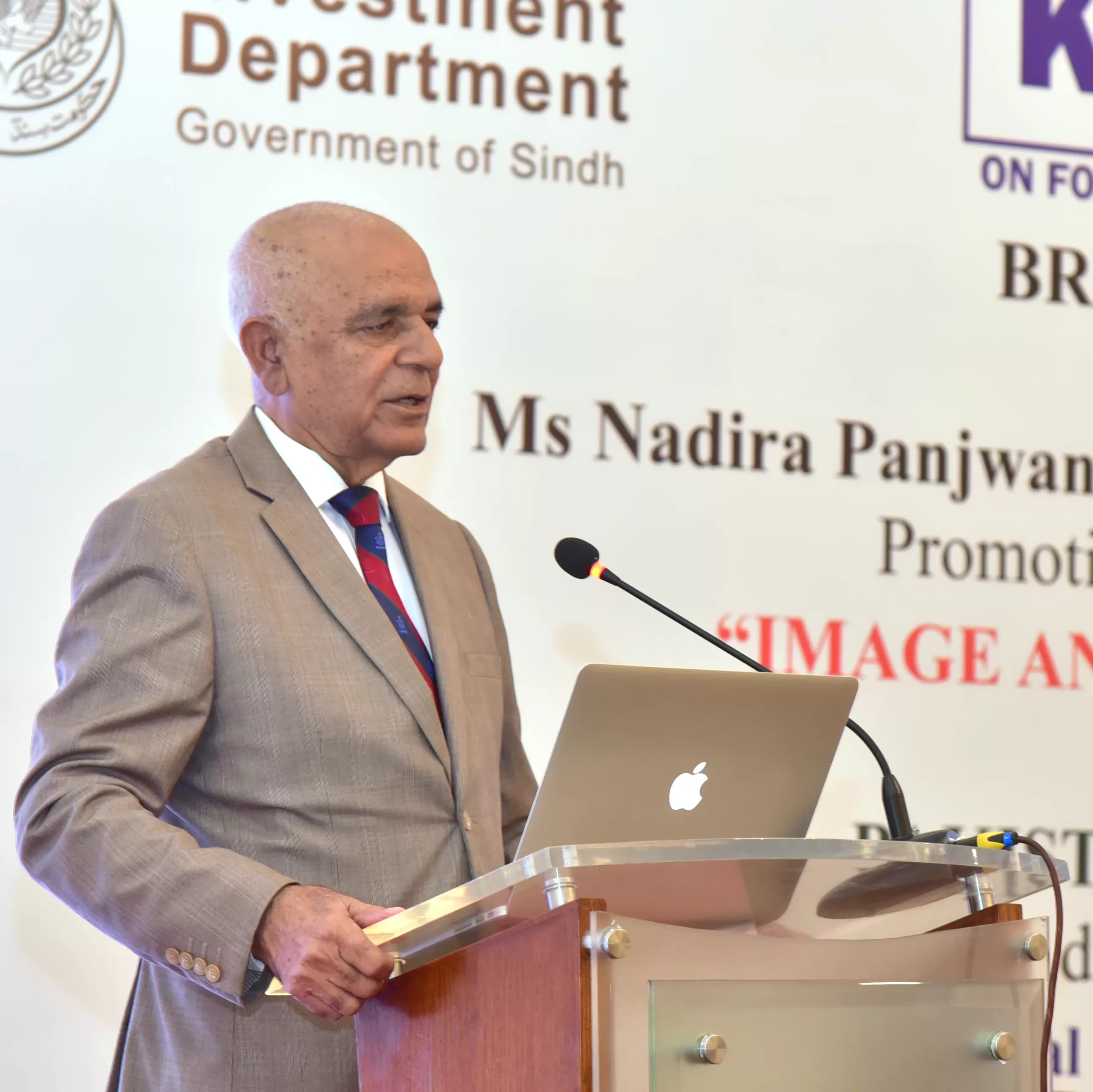
Cdre (R) Sadeed A. Malik Member Board of Governors, KCFR
Ikram Sehgal, Patron-in-Chief of KCFR and Co-chairman of the Pathfinder Group, Ms Nadira Panjwani, Chairperson of KCFR, and Secretary of Investment Department, Assalam U Alaikum. After listening to the comprehensive addresses from previous speakers, it is challenging to add much. However, I would like to share my perspective, which might differ slightly from what has been said so far.
The World Economic Forum in DAVOS has a rich history and I would like to briefly touch upon it before delving into my impressions from my visit to DAVOS in 2023. The World Economic Forum was founded in 1971 by Klaus Schwab, a businessman and professor at the University of Geneva. His inspiration came after a trip to Italy, leading him to gather a group of European business leaders in DAVOS, Switzerland. Initially named the European Management Forum, it was rebranded as the World Economic Forum in 1987 to broaden its vision and provide a platform for addressing international conflicts and global issues. Klaus Schwab, born in Germany, is an accomplished engineer and economist, holding double doctorates and a Master’s Degree in Public Administration from Harvard University. His foresight in bringing together leaders to discuss pressing global challenges laid the foundation for what the Forum has become today.
Since its inception, the World Economic Forum has evolved into a pivotal global platform, facilitating dialogue and collaboration among leaders from various sectors. This year, notable contributions came from esteemed Nobel laureates, including Dr Daron Acemoglu, Dr Simon Johnson, and Dr James Robinson, who were awarded the 2024 Bank of Sweden Prize in Economic Sciences in Memory of Alfred Nobel. They addressed the very questions we are discussing today, highlighting the significance of our collective efforts in shaping a sustainable future.
As I reflect on my experiences at DAVOS, I hope to share insights that contribute to our understanding of Pakistan’s role within this global context. Twenty-three years ago, an influential article titled “The Colonial Origins of Comparative Development” appeared in the American Economic Review (Volume 91, 2001). This seminal work examines the prosperity of nations through the lens of their historical institutions. The study contrasts exclusivity and inclusivity, concepts that Klaus Schwab considered while establishing the European Management Forum (EMF) in 1971.
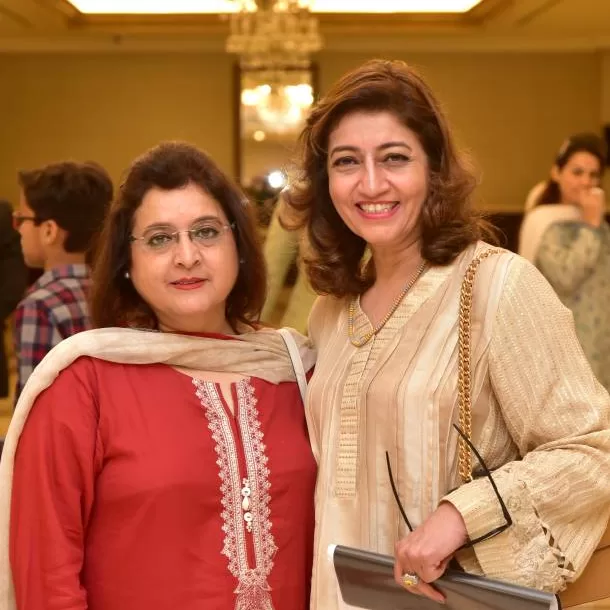
Following the founding of the EMF, the first meeting took place in January 1972, coinciding with a period of minimal tourist activity in Switzerland. By 1973, the foundational DAVOS Manifesto was created, and it has since been renewed in 2020. Ikram Sehgal, I would like to emphasize the significance of this manifesto. Since its inception, the EMF meetings have been held annually in DAVOS, embodying a spirit of openness and cooperation, encapsulated in the principles outlined in the DAVOS Manifesto. This manifesto, revised in 2020, outlines the principles of stakeholder capitalism, aligning with the UN Sustainable Development Agenda. I recall being in France during the mid-1980s when DAVOS began to resonate in the media. While attending a War Course with the Navy in Paris, I crossed into France from Switzerland, where there were no border checkpoints, just a simple line on the road. Now, I understand that checkpoints exist on both sides. From that time, I developed a desire to participate in the World Economic Forum meetings. After retiring, I joined the Karachi Council on Foreign Relations (KCFR), thanks to the late Justice Saeeduzzaman Siddiqui, who later became the President of the Defence Authority Organization. He invited me to KCFR, where I became a member of the Board of Governors.
In the years preceding my visits to DAVOS, our Patron-in-Chief, Ikram Sehgal, had extended invitations to various dignitaries, including Chief Ministers and other notable figures, all of whom received significant press coverage at the Pakistan Breakfast hosted by the Pathfinder Group. Thank you, Sehgal, for your unwavering commitment to flying Pakistan’s flag internationally at DAVOS. In 2023, I hoped to bring my wife along for this experience but she declined, concerned about the cold weather. Upon arriving in Zurich, I purchased a first-class railway ticket for two weeks, which provided a comfortable journey. I then travelled straight to Hamburg, Germany, for a few days, enjoying the scenic views from the train. The Grand Train, a high-speed service, whisked me away at an impressive speed of 280 km/h. After three days, I returned to the airport, where our then Chairman and now Patron-in-Chief, my senior from the Pakistan Military Academy (PMA) about 57 years ago, was there to receive me.
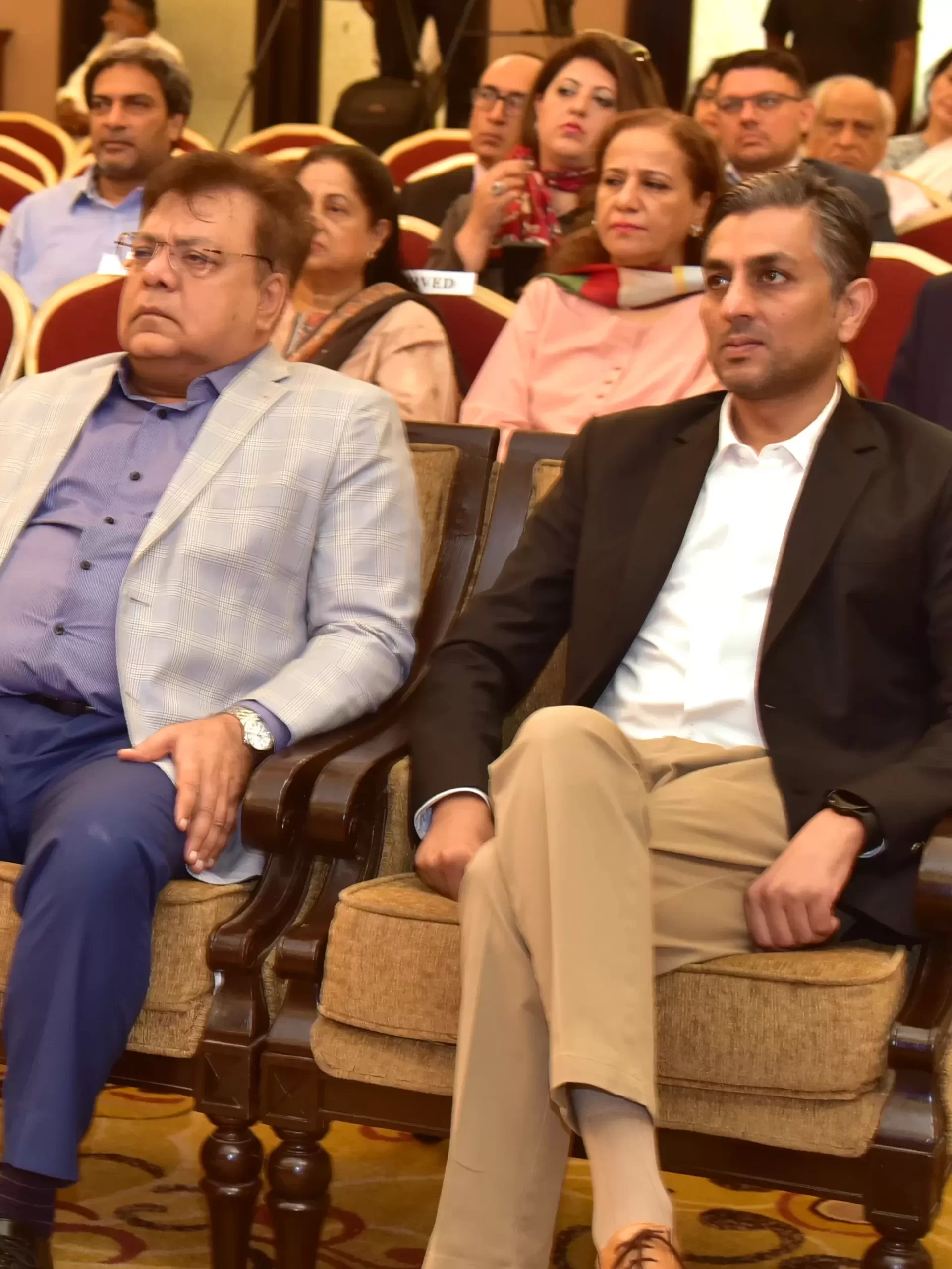
His family took two SUVs, while I travelled with a Turkish driver in a third SUV, heading towards DAVOS. The road to DAVOS, as is typical in Switzerland, was breathtaking. We passed by a smaller yet stunning lake, nestled among hills, not unlike Lake Geneva. Upon arriving in the village near DAVOS, I was accommodated in a hotel. For all four days, we were picked up by a luxury coach generously funded by our Patron-in-Chief and returned on the same bus. Dr Huma Baqai can recall that on our first day in DAVOS, we registered for our ID cards. This led us to the National Pavilion, which has been a topic of discussion. Unfortunately, Pakistan did not have an official pavilion. Our representation was limited to a room in a hotel where our Patron-in-Chief and his family were staying, which was informally designated as the Pakistan Pavilion. During my time in DAVOS, I observed that the largest pavilion belonged to India.
As previously mentioned by other speakers, various Indian states, including Maharashtra and others, also showcased their pavilions. At that moment, I thought it imperative that we establish a pavilion for Sindh at DAVOS in the years to come and I am hopeful that we can achieve this soon. Notably, several Prime Ministers, heads of government, and State Leaders were present at the event, contributing to its significance.
In 2023, Bilawal Bhutto and Ms Sherry Rehman represented Pakistan at the Pakistan Breakfast, which was hosted in a packed hotel. This event was entirely funded by Ikram Sehgal, and the KCFR name was prominently displayed at no cost. The Breakfast was just the beginning, we later enjoyed a luxurious lunch at a mountaintop hotel, accessible by train, once again hosted by Ikram Sehgal. We had yet another lunch, proudly featuring KCFR branding, provided at no cost, thanks to our Chairman and now Patronin-Chief’s representation. As Secretary-General of KCFR, I had the honour of welcoming international guests on behalf of our organization. The list of participants was extensive, and for those interested, a quick search on Google reveals the attendees. After the World Economic Forum at DAVOS, the Pathfinder Group had planned visits to Austria, Hungary, and Italy. I chose to accompany them, and my railway ticket proved invaluable. While I had previously visited these countries, this was my first trip to Hungary.
A meeting was arranged with His Excellency, the Ambassador of Pakistan to Hungary, facilitated by our then-Chairman Sehgal, who had returned to Pakistan due to health reasons. The embassy’s car picked me up for this important engagement and I represented both him and KCFR during the call. I have several recommendations based on my experiences, specifically for KCFR and the Sindh Investment Department. These insights stem from my recent visit and aim to inspire interest in future participation at such forums where we can contribute positively to Pakistan.
1. Plan Ahead: Organize visits to attract international investors. A list of potential investors can be obtained from the Swiss Embassy and KCFR. We need to arrange meetings well in advance; otherwise, our efforts may yield limited results.
2. Target Key Participants: Ensure that recommended participants include CEOs, Chairmen, and Managing Directors from relevant industries.
3. Collaborate with Embassies: The Sindh Investment Department should proactively liaise with embassies to identify and engage significant investors from around the world.
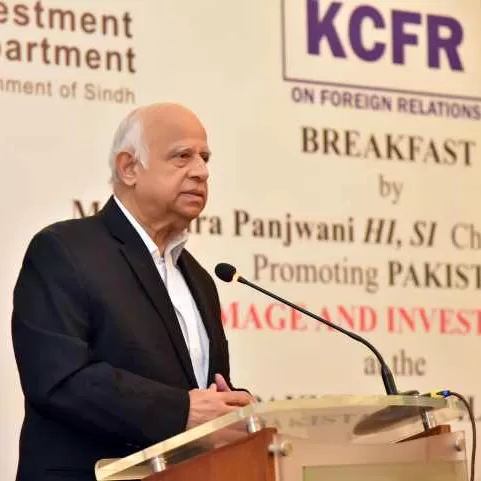
Co-Chairman, Pathfinder Group
Ikram Sehgal Patron-in-Chief, KCFR Co-Chairman, Pathfinder Group
Ms Nadira Panjwani, Ms Huma Baqai, Farhat Ali, Khizar, Tariq Ikram, members of the Investment Board, and of course, Sadeed Malik, I thank you all for your kind words regarding the Pathfinder Group. We have indeed had a long journey together. I’d like to start with something personal. This journey has come at a considerable cost to the company, both financially and personally. My family has made sacrifices along the way, particularly my wife, Shahnaz, my son, and my daughters. They have endured the diversion of funds that would have otherwise gone to them.
I want to express my heartfelt gratitude to Shahnaz for her patience and understanding during this time. I believe they recognized the larger objective I had in mind for our country, and for that, I am truly thankful.
Reflecting on this journey, I realize it was only made possible for many reasons. I initially became a member of the WEF by accident, it’s a long story. I won’t repeat it today. However, after a few years, I became increasingly aware of the overwhelming Indian presence at the forum, contrasted with the near absence of Pakistan’s representation. Despite having some prominent business leaders among our ranks, I often found myself asking, “Why aren’t we doing more? We cannot hope to confront India on such a scale unless we come together.” This prompted me to act. I decided to adopt the same mindset I had when I was in a prisoner of war camp, where I learned that if I wanted to escape, I had to take the initiative myself, others were going to escape along with me.
DAVOS is inherently apolitical. Here, we are all Pakistanis, regardless of our political affiliations be it PMLN, PTI, or PPP. We come together as one nation. Let me share two instances to illustrate this. At one DAVOS Breakfast, Bilawal Bhutto attended, not as the Foreign Minister but as a prominent figure. Imran Khan was sitting on the stage, and Bilawal was in the front row. When they crossed paths, Khan recognized him and remarked on his respect for Bilawal’s mother, the late Benazir Bhutto. The audience responded with applause acknowledging the moment.
Similarly, there was another occasion involving Shahid Khaqan Abbasi, who also exemplified this spirit of unity. Jumping ahead to a more recent event, after Imran Khan was removed from office and Bilawal Bhutto assumed the role of Foreign Minister, my son was hosting the event. He turned to Bilawal and kindly requested that he refrain from discussing domestic politics. In a commendable gesture, Bilawal agreed and even defended Imran Khan regarding his visit to Russia when a question arose about it. These instances highlight that, at DAVOS, we leave behind our political divisions and come together for Pakistan.
Now, regarding my role with KCFR, I became the Chairman quite by accident. Admiral Shahid Karimullah, our esteemed Chairperson, fell ill and had to resign, leaving us in a challenging situation. I must credit Commodore Sadeed Malik for stepping up during this time. While it’s one thing to carry the ball, the hard work was truly done by Sadeed Malik. Our association goes back nearly 59 years to our days as cadets at PMA. I was in the Army Cadet Corps and he was in the Navy Cadet Corps joining shortly after me. That bond we formed during those months has endured and Malik remains one of my cherished friends today.
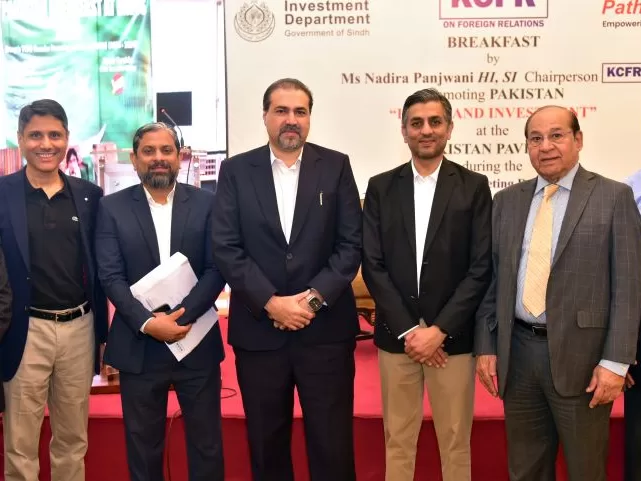
What I want to emphasize about KCFR is how we have stabilized the organization despite facing numerous challenges. The support from the Board of Governors has been exceptional. They played a crucial role in stabilizing KCFR during difficult times. We were fortunate to welcome Ms Nadira Panjwani, who has truly taken KCFR to new heights. I can confidently say that KCFR today is a robust entity, thriving in ways we could not have imagined six or seven years ago when we were concerned about its survival.
Participation at DAVOS is essential for both private businesses and the government as it fosters a vital partnership. The Pathfinder Group can only serve as a platform for this collaboration. My son has taken the reins and has been instrumental in this journey. I am confident he will continue to ensure that the Pathfinder Group remains at the forefront of providing opportunities for engagement.
However, we need the support of Pakistani businessmen more than we need governmental backing. While logistical support from the government is helpful, it is the private sector that will drive our success. I would also like to share that I deliberately paid homage to our national spirit by playing “Dil Dil Pakistan.” It’s a reminder of our shared values and aspirations and the role we all must play in promoting our country’s interests on platforms like DAVOS.
One of the most rewarding experiences for me at the World Economic Forum was when a representative approached me and shared something remarkable. He said, “Today, I witnessed something I thought I would never see in my life.” I was intrigued and asked what it was. He replied, “I saw two of your CEOs setting up a banner together, while another CEO was taking photos with a group of people gathered around.” This moment truly encapsulated the spirit of collaboration and pride in showcasing what Pakistan is capable of.
I am incredibly proud to be a part of a group of young individuals who are dedicated to establishing and promoting Pakistan on international platforms. You might have heard discussions at the World Economic Forum about the Asaan Mobile Account (AMA), yet you may not realize its significance. To date, there are 11.3 million accounts opened through this initiative.
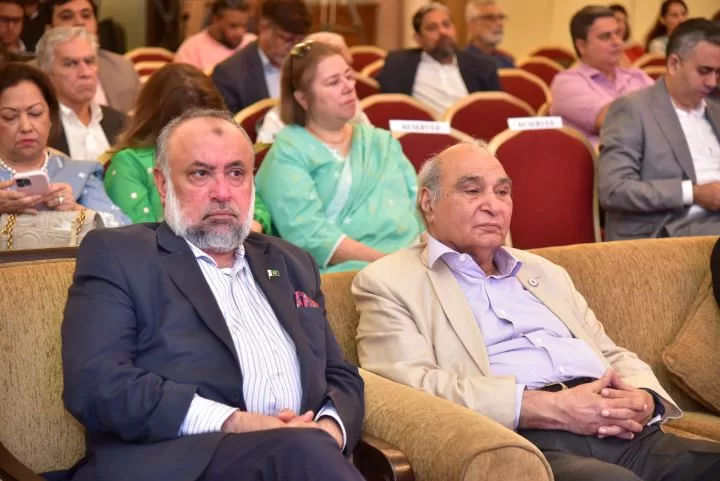
This is a tremendous achievement, especially considering that a large segment of the population remains unbanked. The Pathfinder Group has made strides in uplifting those who often go unnoticed. We have elevated the status of security guards in our country by ensuring they receive proper salaries, benefits, and job security.
Similarly, through initiatives like the Virtual Remittance Gateway (VRG) and iPath, we are providing essential financial services to the community. It’s crucial to remember that until recently, about 80% of Pakistan’s adult population was without a bank account. Thanks to the Asaan Mobile Account (AMA), that figure is changing rapidly with 11.3 million people now gaining access to banking services. This transformation is vital for empowering the common man and providing opportunities for financial inclusion.
The Asaan Mobile Account (AMA) is a groundbreaking initiative that we are actively working on with the State Bank of Pakistan. Insha’Allah, within the next three weeks to a month, we will introduce a feature that allows individuals without smartphones to access banking services using USSD technology. This means that even those without smartphones can receive transactions and cash out at various kiosks, such as Jazz, Telenor, UBL, and many bank branches. This is a significant step towards agent interoperability, making financial services more accessible to everyone.
Moreover, we have introduced a virtual card named Paylite which eliminates the need for a physical card. With this virtual card, even the most economically disadvantaged individuals can order food from places like McDonald’s. This is not just about convenience, it’s about empowerment. For someone living in poverty, having access to cash or necessities which we refer to as Roti (Bread), and Kapra (Clothes) is essential. However, without a bank account, it’s nearly impossible for them to obtain even a low-cost home.
The beauty of the Assan Mobile Account (AMA) lies in its simplicity. Anyone can create an account in less than two minutes using their mobile phone, and they don’t even need to visit a bank branch. The World Economic Forum is highlighting this initiative as a leading example of providing manyto-many solutions for the underprivileged around the globe.
Initially, I referred to this virtual card as the “poor man’s debit card,” but the World Economic Forum suggested a more dignified term, the “deprived person’s credit card.” While that name is a bit long, it reflects the transformative nature of this initiative.
The essence of what I want to convey is that DAVOS has provided us with an invaluable platform, one that connects us with 42 Islamic countries and many underdeveloped nations where access to banking services remains limited. Currently, VISA is eager to engage with us, and that interest stems from the proactive steps we took at DAVOS.
This opportunity extends to various sectors here in Pakistan, whether in textiles, services, IT, or beyond. I have witnessed how India has leveraged its presence at DAVOS for exponential growth and I believe we can achieve the same. I want to express my gratitude to KCFR and the Sindh Investment Department for their partnership and support. It is vital for all of us as Pakistanis, regardless of our political affiliations, bureaucratic positions, or military backgrounds to unite for our country. Let’s focus on doing whatever we can, no matter how small, to contribute positively to Pakistan.
Finally, as Dr Baqai mentioned about Shahid Khaqan Abbasi that he made a very meaningful remark in Urdu. Someone asked Shahid Khaqan Abbasi why the government isn’t supporting the Pathfinder Group’s efforts in DAVOS. He responded by saying, “If the government does, the efforts currently being made by the Pathfinder Group will also be diminished.”
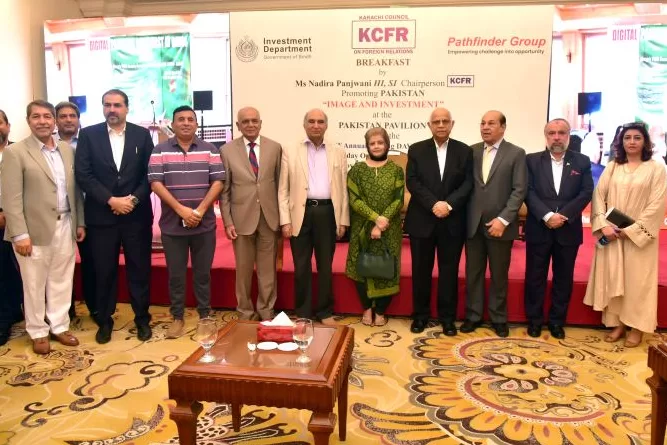
In conclusion, I want to emphasize that while we require the government’s support, it’s not merely financial, we also need moral and logistic support. This type of backing is essential for us to move forward effectively.
I would like to extend my heartfelt thanks to Ms Nadira Panjwani and Ms Huma Baqai for their unwavering partnership, not only within KCFR but also for our endeavours at DAVOS. This year, we are excited to include an education group as part of our delegation, Insha’Allah.
As we navigate the challenges of the Fourth Industrial Revolution, we must focus on these critical sectors: financial inclusion, women’s empowerment, health, and education. Additionally, we are increasingly drawn into the realm of artificial intelligence (AI), which is a significant area of interest at the World Economic Forum.
Thank you all for being here on this Sunday morning. Together, let’s work towards building a better future for Pakistan.




